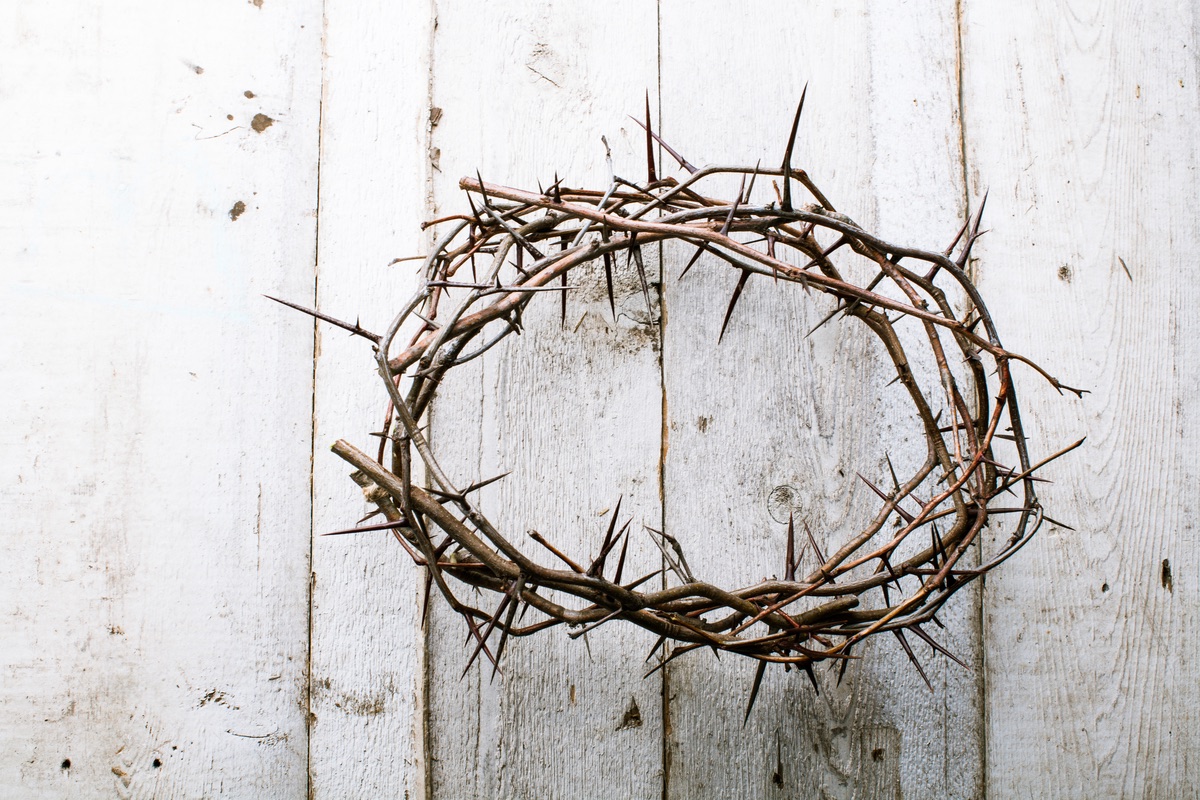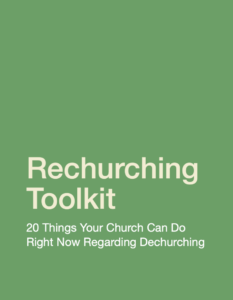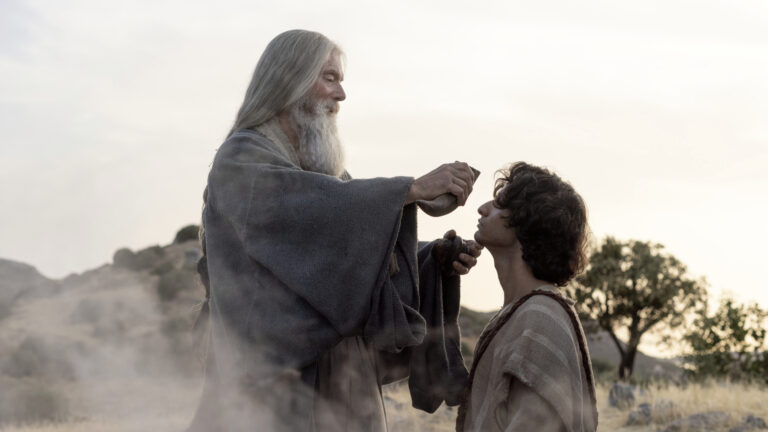As we enter Holy Week—that sacred span from Palm Sunday to Easter Sunday—here is a day-by-day breakdown of what Scripture tells us happened on each day.
Use this guide to lead you through Scripture reading this week.
Palm Sunday
(For a full account of the events of this day, see Matthew 21:1–11, Mark 11:1–11, Luke 19:28–44, John 12:9–19.)
When Jesus rode into Jerusalem perched on a colt, it was the first time since raising Lazarus from the dead that he’d shown his face in the city. The story of Lazarus’s resurrection had circulated so that many regarded Jesus as a celebrity. Everyone wanted to catch a glimpse. They went out to meet him and received him like a King, because they heard he had done this (John 12:18).
Jesus said Lazarus’s death would end in the faith of many, and in the “glory of God—that the Son of God may be glorified through it” (John 11:4). But the glory he had in mind was even more glorious than his triumphal entry into Jerusalem. In fact, he wasn’t referring to the glory these people gave him at all. Lazarus’s resurrection would steel the resolve of the religious leaders to hand Jesus over to a death he would embrace—a death he would conquer. That was the glory he meant. As he rode into Jerusalem, the people cried, “Your King is coming!” They praised his victory over Lazarus’s death. But the irony was that he wasn’t coming to claim his crown on account of Lazarus’s death and resurrection, but on account of his own.
Monday
(For a full account of the events of this day, see Matthew 21:12–22, Mark 11:12–19, Luke 19:45–48.)
If Jerusalem was a beehive, with his triumphal entry Jesus had hit it with a stick. You could hear the buzz grow as the anger within got organized. His kingly arrival was a strong declaration about his authority over all the conventions of man.
On Monday, Jesus returns for more—this time to declare the failure of God’s people to live up to their covenant mandate to be a blessing to the world. Much of what the Gospels tell us about Monday centers on the theme of Jesus’s authority—both over the created world and his right to judge it. Everything Jesus did, he did with authority. So when he awoke his disciples Monday saying he wanted to go back into Jerusalem to teach, as risky as it sounded it wasn’t surprising. Everyone sensed something stirring, as if Jesus had rounded a corner and his end was coming fast. He was a marked man.
Tuesday
(For a full account of the events of this day, see Matthew 21:23–26:5, Mark 11:27–14:2, Luke 20:1–22:2, John 12:37–50.)
If Monday’s arrival in the temple was an all-inclusive, living parable of cleansing God’s house, Tuesday’s entrance is a direct, verbal confrontation with the appointed leadership. After Jesus clarifies he doesn’t regard these leaders as having any authority over him, he spends the rest of the day right there in the temple to teach the people God’s Word. But Tuesday afternoon is the last time Jesus publicly teaches in the temple as a free man. His words on this day are his closing argument, his manifesto.
When Jesus leaves the temple on Tuesday, the chief priests and scribes are “seeking how to arrest him by stealth and kill him” (Mark 14:1). But they can’t take his life from him solely on the strength of the charges they plan to bring—not if he defends himself. But he won’t. Instead, by his silence, he’ll offer up his life for a world of blasphemers and traitors and liars. This was what he has come to do, and as he exits the temple that Tuesday afternoon, he knows he will do it soon.
Wednesday
(For a full account of the events of this day, see Matthew 26:6–16, Mark 14:3–11, Luke 22:3–6.)
The past several days have been a rush of tension and anger for Jesus’s opponents—and of unflinching resolve for Jesus. Words have been his currency, and he’s spent piles of them. But on the Wednesday before his death, Jesus is still.
He is in the home of Simon the Leper, a man known by what’s wrong with him. During their meal together, Mary of Bethany—Lazarus’s sister (John 12:3)—comes to Jesus with an alabaster flask of perfume. She’s been saving this perfume, worth a year’s wages, for this exact occasion (John 12:7). She begins pouring it on Jesus’s head and feet, which requires breaking open its container (Mark 14:3). Like popping the cork on a $20,000 bottle of champagne, this was a deliberate act. She is offering Jesus everything she has. By giving her most valuable possession to him, she is expressing her knowledge that what he’s about to give of himself is for her.
What Mary does is beautiful, and Jesus wants everyone to know it. She is preparing him for burial. There is honor and kindness in her gesture. Jesus returns the honor by saying history will never forget her act of beauty. And we haven’t.
Thursday
(For a full account of the events of this day, see Matthew 26:17–75, Mark 14:12–72, Luke 22:7–71, John 13:1–18:27.)
The Thursday prior to Jesus’s crucifixion fills many pages in Scripture. It begins with John and Peter securing the upper room. There, Jesus washes his disciples’ feet, explaining he is there to make them clean.
As they begin to eat, Jesus announces one of them is about to betray him. Each wonders if he means them. Then he dispatches Judas to do what he intends.
During this last supper, Jesus sets apart the Passover bread and cup and reassigns—or better, perfects—their meaning. The bread is his body. The cup, his blood. This meal will no longer remind them of God’s deliverance primarily from the external tyranny of Pharaoh, but from the internal tyranny of their own guilt and sin against God.
Jesus prays for his friends and those who will come to know him through them—that his Father would make them one (John 17). Then Jesus and his friends leave for the Mount of Olives to pray (Mark 14:33). But he isn’t there only to pray. He is also there to wait. Soon a line of torches snake their way toward him in the darkness. This is what he has been waiting for.
Good Friday
(For a full account of the events of this day, see Matthew 27:1–61, Mark 15:1–47, Luke 23:1–56, John 18:28–19:42.)
On Thursday night in Gethsemane, Jesus was arrested—betrayed by one of his disciples and abandoned by the others. The chief priests and the Sanhedrin called for secret trials in the dead of night, and the verdict handed down was that Jesus would be crucified. This is something the Roman prefect, Pontius Pilate, has to execute. And reluctantly, he does.
After a severe beating, Jesus is nailed to a cross where he remains for six hours until dead. Never before or since has more been lost and gained at the same time. The world gained the atoning sacrifice of Christ. But for those present, either the significance of the moment is lost on them or their hearts break as the One they thought to be the Savior of the world dies at the hands of Rome. They can’t stop it, and they don’t realize it’s for them. They hoped in him, and though he’d told them he would suffer many things and rise three days later (Mark 8:31), how could they have possibly known this was what he meant?
Saturday—The Forgotten Day
(For a full account of the events of this day as found in the Gospels, see Matthew 27:62–66.)
Less is written about the Saturday following Jesus’s crucifixion than any other in the scope of this week. Yet what makes it unique is that this is the only full day in history where the body of Christ lies buried in a cave.
Yesterday, he was crucified. Tomorrow, he rises from the grave. But what about today? Though we may not make much of this day, when we look at the few verses the Gospels give us about it, we find it was by no means forgotten by the chief priests who had handed Jesus over to death. During his earthly ministry, Jesus repeatedly said he would die in Jerusalem at the hands of the chief priests, yet on the third day rise again (e.g., Matt. 12:40; Mark 8:31; 9:31; 10:34).
Of course, the chief priests scoffed. But they didn’t forget it. On the day between Good Friday and Easter Sunday, Jesus’s prediction preoccupies their thoughts such that they simply can’t leave it alone. Matthew 27:62–66 tells the strange story of how they can’t dismiss out of hand the possibility that Jesus might know something they don’t.
Resurrection Sunday
(For a full account of the events of this day, see Matthew 28:1–20, Mark 16:1–8, Luke 24:1–53, John 20:1–21:25.)
Early Sunday morning, some of Jesus’s friends set out for his grave to anoint the body of their friend and teacher. When they arrive, however, they are greeted by what one Gospel writer calls “a man dressed in lightning.” He tells them Jesus is not there, as he said. He is risen.
In the week leading up to his death, the Good Shepherd went out to meet the wolves of judgment, sin, and death—and he did so with all authority. One might wonder, what good has it ever done anyone to die for some cause? This is the glorious beauty of the gospel. Jesus didn’t die as a martyr for a cause. He was never in the wrong place at the wrong time. He was never at the mercy of anyone. He lived, died, and was buried because he meant to be.
No one took his life from him. He laid it down. For whom? For his flock, his people.
And he laid it down only to take it up again (John 10:18). The point of the cross was not just to die, but to die and rise again, defeating the prowling wolves of sin and death themselves.
Easter says of Jesus, “He meant it! He meant to lay down his life for you. And as surely as he has taken it up again, he knows you and loves you.”
Editors’ note: For a fuller look at the first Holy Week, see Andreas Köstenberger and Justin Taylor’s book, The Final Days of Jesus: The Most Important Week of the Most Important Person Who Ever Lived (Crossway, 2014). A version of this article appeared at the Christ Presbyterian blog. The above timeline reflects one possible breakdown of the events of the last week of Jesus’s earthly ministry, based on this author’s best synthesis of the four Gospel accounts.
20 Things You Can Do Right Now to Prevent Dechurching
 We’re currently experiencing the largest and fastest religious shift in the history of the United States. But there are practical things we can do inside our local churches.
We’re currently experiencing the largest and fastest religious shift in the history of the United States. But there are practical things we can do inside our local churches.
Jim Davis and Michael Graham have commissioned the largest and most comprehensive study of dechurching in America. Informed by their findings, they’ve written a book and developed this corresponding toolkit with resources to help you address the dechurching phenomenon.
We’re delighted to offer you the ‘Rechurching Toolkit’ for FREE today. Click on the link below to get instant access to this resource—worth $100—and be equipped to understand and address the issues behind dechurching.


































